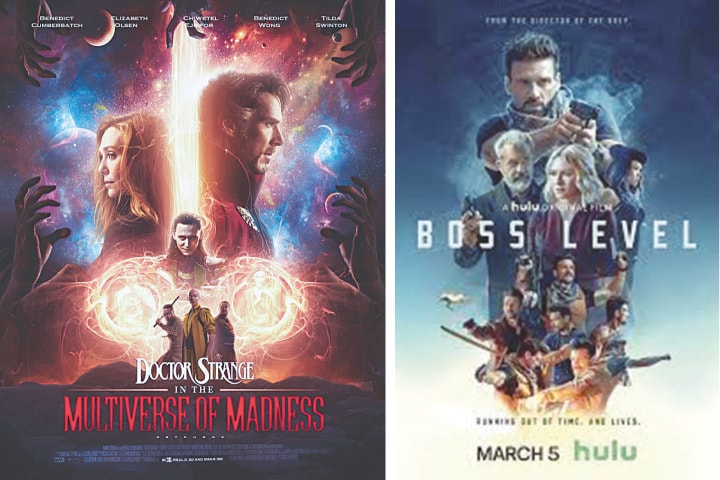
In the climatic moments of Doctor Strange (2016), Stephen Strange (Benedict Cumberbatch), aided by the Time Stone — a key Infinity Stone from Marvel’s first cinematic story arc — traps himself and the evil god-like inter-dimensional entity Dormammu (also Cumberbatch) inside an endless time-loop. In this time-loop, he continuously dies at the villain’s hands, only to revive and relive a version of that moment instances later.
In the concluding saga of the chapter, Avengers: End Game (2018), time travel and time-loops — via the Time Stone and the Quantum Realm from the first Ant Man (2015) film — become principal plot devices that empower our heroes to jump through events in previous Marvel movies Guardians of the Galaxy (2014), Thor: The Dark World (2013) and the climax of the first Avengers (2012), in a reckless attempt to change their bleak future.
Like two years before in Doctor Strange, screwing up and resetting time gave the characters in End Game that extra creative mileage to push stories seamlessly into new arcs for the expanding Marvel film universe; the upcoming series Loki, for example, thrives on this concept.
While time travel story elements aren’t new to the comic world — it has been an ingenious, at times liberating, if done-to-death, go-to cliché for writers when they break away from routine stories — the use of time-loops in Doctor Strange hints at the sudden popularity surge in time-loop stories.
Time travel — and its aggressive sub-genre, the time-loop — has long been a staple in ingeniously written stories in fiction and cinema. But its prevalence seems to be on the rise in recent years
The list is exhaustive, but you may know these popular ones: Groundhog Day (1993), The Girl Who Leapt Through Time (an award-winning anime from 2006), Source Code (2011), Edge of Tomorrow (2014), ARQ (2016, often trending on Netflix), Before I Fall (2017), the South Korean movie A Day (2017), Happy Death Day (2017) and its sequel Happy Death Day 2U (2019), Naked (2017), the pathetically thought-up Bollywood/Tollywood film Game Over (2019), See You Yesterday (2019), Palm Springs (2020), Love Wedding Repeat (2020; a remake of the 2012 French film Plan de Table), Boss Level (2021), The Map of Tiny Perfect Things (2021), and this year’s Oscar-winning live action short film Two Distant Strangers (2020), where a racially biased cop kills an African American youngster over and over.

Note the frequency of titles in the last few years — and this is just for one subgenre. And we’re not even talking about popular mainstream time travel films such as Back to the Future (1985), Bill and Ted’s Excellent Adventure (1989), 12 Monkeys (1995), Kate and Leopold (2001), Timeline (2003), The Butterfly Effect (2004), Primer (2004), Harry Potter and the Prisoner of Azkaban (2004), A Sound of Thunder (2005), The Lake House (2006), Déjà Vu (2006), Next (2007), The Time Traveler’s Wife (2009), Looper (2012), About Time (2013), the superb Predestination (2014), Interstellar (2014) or — if you count the hypothetical weirdness of it — Tenet (2020) … and these are just titles from the top of my head.
Time travelling as plot devices is evident in films that don’t necessarily feature time traveling as its main concept. The big reveal at the climax of Planet of the Apes (1968) is possibly the greatest, and the most popular — and at the time, most shocking — example of the genre.
Films such as Predestination (an adaptation of Robert A. Heinlein’s 1959 short story ‘All You Zombies’) is a riveting mix of both paradoxical time-loop and time travel genres (paradoxes are a staple of the genre, by the way).
In a manner of speaking, time-loop stories are essentially aggressively plotted time-travel stories set within a confined time period — i.e. pocket universes; a small fracture of reality, often spanning a few hours or, at maximum, one single day, where characters are stuck in an endless, recurring loop of events, until they figure a way out of the circle.

Unlike regular time-travel stories — say Back to the Future, where a definitive time-travel device takes our heroes back and forth through time — time-loop stories are more open to unscientific, supernatural, or even whimsical means to set the story in motion.
In Love Wedding Repeat (one of the few lacklustre films in this subgenre), the time-loop is presented as a hypothetical question of how a wine glass doused with sedatives turns a wedding on its head. For a story about possible futures, we only get to see one alternate possibility.
The flawed concept in Source Code has an almost-dead soldier (Jake Gyllenhaal) hooked up to a machine that reconstructs a terrorist bombing from the memories of dead passengers on a speeding train. The soldier must repeatedly travel back into an eight-minute window in the past, into another man’s body, and find the bomber before the train explodes.
The scientist who designed the ‘Source Code’ argues that the people our hero sees are ghosts of the past who cannot be saved. However, with starkly different series of events taking place with every time jump, isn’t the protagonist meddling with the past of alternate realities? And if so, what about the bodies and souls he’s commandeered from the man on the train?
By default, beefy questions about souls and moralities are often side-tracked in favour of heightened dramatics, even if the characters are constantly battling moral decisions.

Laws of science are similarly damned — specifically causality, time and space, entropy and the Laws of Thermodynamics (in the case of Tenet), which govern how and why time moves forward, and why going backwards in time is near-impossible (the debate of how time travel is only possible in select hypothetical circumstances is a topic for a more scientifically inclined magazine).
Oftentimes, a wondrous device that bends time is placed in the narrative, but when it’s not, the characters simply gain the ability to go back or forward in time.
While intertwined destinies may be a part of the protagonists’ frantic race against the clock, death is seen mostly as a restarting point, ala video games.
In Edge of Tomorrow (originally a light novel — i.e. novels with pictures — and a Japanese comic, i.e. manga), Tom Cruise’s cowardly army major, a PR man with no combat skills, is relegated to the frontlines. During combat, he gets doused with the blood of an ‘alpha’ alien that gives him the innate ability to relive the day when he dies.
Cruise’s character is effectively confined to a small window of time, which he replays, but destinies and fates of other characters don’t change as much. It’s almost a linear way of looking at time travel/ time-loops, where things change yet mostly remain the same.

Harry Potter and the Prisoner of Azkaban provides the tidiest, uncomplicated time-loop variant to date. In a fight with wraith-like Dementors, Harry is saved by someone who looks like his dead dad. As it turns out, it was Harry saving himself by returning to that point in the past.
Of late though, the cliché, which is technically also the hook of the genre, is starting to wear thin.
Happy Death Day 2U, the sequel of the refreshing Happy Death Day — a mix of college-set adult comedy and time-loop story — became a subpar continuation when it introduced a scientific contraption that trapped Jessica Rothe’s character in the loops. In this case, the original’s supposed ‘supernatural’ premise made more sense.

Boss Level (2021), starring Frank Grillo, Mel Gibson, Naomi Watts, and directed by Joe Carnahan (Narc, A-Team), is a mostly fun take on video games (the title refers to the often difficult final level of a video game), with very little other than its premise holding the film together.
In a bid to put out a statement about racial bigotry in America’s law enforcement, Two Distant Strangers’ filmmakers decisively choose to forego a veritable conclusion to their story. While the idea sparks dialogue and highlights a very real racial predicament in the US, the characters remain blatantly black and white — in both literal and figurative terms; the young innocent hero who gets gunned down is African-American and the bald cop is a stereotypical representation of white supremacist America. Without an absolute conclusion, the film feels more like a message than a story.
A similar premise was introduced in See You Yesterday (2019), where two African-American teenagers travel back in time again and again to stop their brother from getting shot by the police.

There are, of course, exceptions — such as the brilliantly written and multi-award winning critical favourite Palm Springs (2020), starring Andy Samberg, Cristin Milioti and J.K. Simmons, where insecurities and self-doubt take the reins of the story.
With the Marvel Studio’s foreseeable influence on movies and tent-pole series attuning audiences to serious time-bending stories with Loki, Ant-Man and the Wasp: Quantumania and Doctor Strange and the Multiverse of Madness (to name a few) for the next few years, there is high probability that the genre will continue to explode, until it runs out of steam.
Nevertheless, time-loops, irrespective of cliché and constraints, is perhaps one of the most versatile and engrossing genres in movies at the moment. The possibilities of telling good stories are, literally, endless … lest filmmakers start repeating themselves senselessly.
Published in Dawn, ICON, May 30th, 2021















































Dear visitor, the comments section is undergoing an overhaul and will return soon.